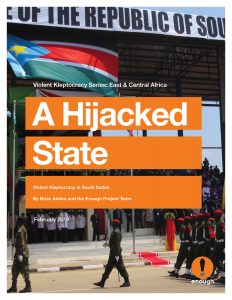 Download the full report.
Download the full report.
By Brian Adeba and the Enough Project Team
Executive Summary
On September 12, 2018, the South Sudanese government and the armed opposition signed a peace deal that could potentially end the 5-year-old conflict, if elites exercise the political will required to implement the agreement. The South Sudanese conflict is rooted in the violent kleptocratic system of governance that the ruling Sudan People’s Liberation Movement (SPLM) began building in 2005, after the end of the Second Sudanese Civil War (1983–2005). When President Salva Kiir became the chair of the SPLM and the leader of the autonomous Government of Southern Sudan from 2005 to 2011, a network of allies formed and positioned itself to make decisions about the distribution of influence and oil wealth.
In 2011, Kiir became president of newly independent South Sudan, and these key allies drafted the Transitional Constitution, which vested immense powers in Kiir’s hands that allowed him, for instance, to prorogue (discontinue without dissolving) the national legislature, fire elected governors, and dissolve legislative assemblies in the country’s states. The destructive competition over power and access to opportunities for corruption resulted in a slow expulsion of some elites from the center of power and a consequential rise in power of others, dividing the ruling party into two factions, for and against Kiir. Those opposed to President Kiir largely coalesced behind Vice President Riek Machar.
South Sudan’s oil production was at its height in 2011 when the global prices of crude oil averaged over 100 U.S. dollars per barrel, which allowed the country to pocket a monthly average of 500 million U.S. dollars from its share. When South Sudanese authorities shut down oil production because of conflict with Sudan that had turned violent along the border, production remained suspended for 15 months—between January 2012 and March 2013—quickly creating a significant deficit in a young economy so heavily reliant on oil for its revenues and gross domestic product (GDP). The government’s sudden loss of over 90 percent of cash from oil revenues disrupted entrenched patterns of corruption and tested the limits of the violent kleptocratic system, culminating in a bloody conflict in December 2013. This crisis in turn plunged South Sudan into a series of interrelated economic, fiscal, security, political, and humanitarian crises.
In South Sudan’s system of violent kleptocracy, leaders have hijacked institutions and stoked violent conflict, committed mass atrocities, and created a man-made famine. Amid the chaos of war, the ruling elites ransacked various sectors of the economy. South Sudan’s violent kleptocracy has distorted the country’s institutions, heaping catastrophic consequences on the national monetary reserve and creating an atmosphere in which too many hands are left to freely and repetitively reach into the public treasury with impunity. Services remain undelivered, business practices undermine the rule of law, and corruption abounds.
While poor regulatory mechanisms made it easy to loot the public treasury with little consequence, the ruling elites could have chosen to improve institutions of accountability rather than deliberately disempower them. South Sudan’s leaders have incorporated corrupt practices inherited from the north-south war into the current government.
Without strong and effective institutions in place, military leaders dominate the decision-making processes on public spending to wield both power and money opportunistically. These leaders have abused their positions of power to steal from public coffers, wage war, and enlarge patronage networks. Violent conflict in South Sudan today stems from competitive corruption that has characterized governance since 2005. Leaders use violence as a means of capturing the national economy and budget and to prolong their stay in power for the purpose of self-enrichment. Oil has represented the key prize in South Sudan since independence. The political elites enrich themselves with oil revenues at the public’s expense and to the detriment of the economy and ordinary citizens.
Nevertheless, the status quo could be different. U.S. policymakers and international partners can now use the power of the U.S. dollar and the international financial system—on which South Sudanese leaders rely almost exclusively—to target these leaders’ finances and the networks that enable the violent kleptocracy to continue to harm the South Sudanese people. In September 2017, the U.S. Department of the Treasury initiated a process of holding South Sudan’s leaders accountable for the egregious corruption that feeds war in their country. In the wake of the recently concluded peace agreement, the financial pressures enacted by the Treasury Department must continue because the deal itself lacks meaningful stipulations to end the endemic corruption, heightening the potential for a return to conflict.
To be fully effective in thwarting the interests of leaders who may choose to violate the latest peace deal, network sanctions, anti-money laundering measures, prosecutions, and enhanced travel bans must be applied in a genuinely concerted and comprehensive manner. It is also crucial to focus on grievances, inequalities, and violence at the ground level. Primarily, the international community and the region should make it clear they stand with the people of South Sudan: implement and aggressively enforce these enhanced measures of financial pressure that can begin to build leverage over the competing elites, and deliver justice and accountability for the many victims of the war to foster long-term stability.
There needs to be a greater focus on removing the rewards of competitive corruption by focusing on both South Sudan’s decision-makers and the international firms that enable them. The priority should be to monitor these entities and implement the necessary pressures needed to stop them and thereby dismantle the entrenched violent kleptocratic system, which is a prerequisite for lasting peace, good governance, and human rights in South Sudan. Instead of trying to forge comfortable power-sharing agreements, the focus from the region and broader international community must be on creating consequences for bad actors, as this is the only path to a transformed and reformed functional state in South Sudan. These pressures can help deny the leaders material resources used to perpetuate large-scale violence in South Sudan.
This pressure also needs to extend in the region. In June 2018, the U.S. Treasury Under Secretary for Terrorism and Financial Intelligence, Sigal Mandelker, traveled to Uganda and Kenya to deliver a strong message on the need for action against the proceeds of South Sudanese corruption that are laundered into neighboring banking systems. This message must continue to be developed with specific pressures delivered not only by the United States, but also by the United Nations (U.N.) Security Council, European Union, African Union, and regional bodies.
 Download the full report.
Download the full report.
Help support real change in South Sudan by letting your representative know that building strong leverage and making smart investments in institution building in South Sudan are essential for long-term peace and prosperity. Take Action Now

